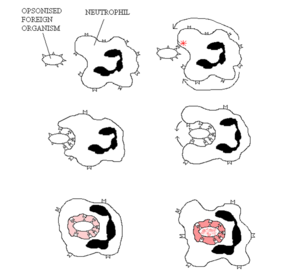Difference between revisions of "Phagocytosis"
Jump to navigation
Jump to search
Rjfrancisrvc (talk | contribs) |
Rjfrancisrvc (talk | contribs) |
||
| Line 18: | Line 18: | ||
==Links== | ==Links== | ||
| − | *[http://www. | + | *[http://www.youtube.com/watch?v=fpOxgAU5fFQ Video of chemotaxis and phagocytosis] |
*[http://www.youtube.com/watch?v=U8QoO71lt-M&context=C4a8ea38ADvjVQa1PpcFO3vYijexJH_LpjoWjuUy831e6skih3JQA= Phagocytosis in 4D (3D + Time)] | *[http://www.youtube.com/watch?v=U8QoO71lt-M&context=C4a8ea38ADvjVQa1PpcFO3vYijexJH_LpjoWjuUy831e6skih3JQA= Phagocytosis in 4D (3D + Time)] | ||
<br><br> | <br><br> | ||
{{Jim Bee 2007}} | {{Jim Bee 2007}} | ||
[[Category:Innate Immune System]] | [[Category:Innate Immune System]] | ||
Revision as of 09:22, 25 April 2012
- Phagocytosis is a very primitive system of defence against infection
- Even exists in invertebrates
- Phagocytosis is a form of endocytosis (cell eating), it is the method of removal of bacteria and dead cells by vesicular internalisation
- The internalised vesicle is referred to as the "phagosome"
- Lysosomes, which contain a large range of enzymes, fuse with the phagosome, killing the microbes in an energy-dependent way
- Oxygen-dependant degradation utilizes Oxygen and chlorine free-radicals, Hydrogen peroxide, and Nitric oxide
- Oxygen-independant degradation depends on granules containing proteolytic enzymes such as Defensins, Lysozyme, and cationic proteins
- In addition, these granules contain antimicrobial elements such as lactoferrin
- Microbes are then digested by a number of different catabolic enzymes
- Glycosidases: Digest carbohydrates
- Lipases: Digest lipids
- Proteases: Digest protein
- Waste products of phagocytosis are either exocytosed or further degraded by the phagocyte
- Neutrophils and macrophages are phagocytic
- Opsonins promote and accelerate phagocytosis
- Phagocytic cells target pathogens by using cell membrane receptors (PRRs) that recognise intrinsically foreign components of microorganisms (pathogen-associated molecular patterns; PAMPs)
Links
| Originally funded by the RVC Jim Bee Award 2007 |
